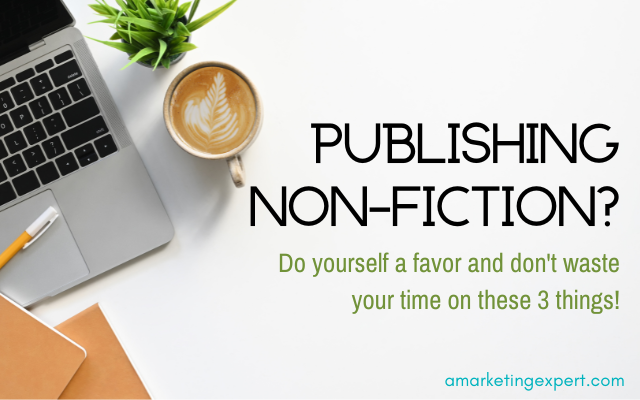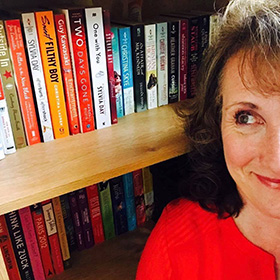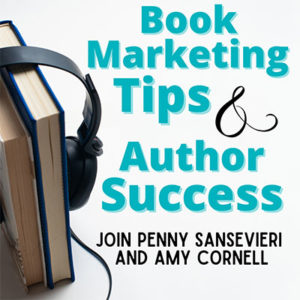Typically when someone is publishing non-fiction it’s because they’re looking to cement their thought leader status in the market for a specific topic, industry, or area of expertise.
But we see it all the time, specifically when publishing non-fiction, that authors get hung up on all the wrong things. It throws the momentum out of whack, and can even create critical delays in getting the book to market at the optimum time.
And by the optimum time I mean before their content starts to become dated. Very few books are truly evergreen in this day and age, so publishing non-fiction comes with some time constraints and requires a healthy level of urgency and fortitude.
Without a doubt, you or another author you know is delaying their book because of one of these three reasons, and honestly, it’s time that can’t be wasted!
In fact, I’ve had authors delay their books indefinitely waiting on these three things, and in some cases, they become so discouraged that they never release the book.
So if you’ve been sitting on your book, or you’re getting ready to launch a book but are holding back, this is a must-read article!
Writing a Book to Grow Your Thought Leadership? Here’s What You Shouldn’t Waste Your Time Worrying About.
By Anna David for Entrepreneur.com
When it comes to launching their first book, many entrepreneurs sweat the small stuff while ignoring what really matters.
You’ve heard it said 101 times: If you’re a successful entrepreneur who wants to grow your thought leadership, you need to write a book.
The problem is that you may not know much about publishing beyond the fact that you have favorite books, and you’d like yours to be like them. Without knowing what to prioritize when it comes to publishing, you can end up caring about small aspects that don’t matter while ignoring the most important aspect of all: producing an excellent book.
Having been in the publishing industry for over two decades — first writing six books for traditional Big Five publishers, even making the New York Times bestseller list on one of them, and then moving into the indie world where I publish books for entrepreneurs — I’ve both made a number of incorrect assumptions and seen many others do the same when publishing non-fiction.
Don’t bother with a foreword
It can be fun to fantasize about getting that big-name person you know or have met once or are sure would love your book if only he or she could see it to write your foreword.
Forewords also don’t matter.
Have you ever bought a book because of the foreword writer? I haven’t either.
The only reason forewords matter today is that the foreword author can be listed alongside you on the book’s Amazon page. It’s undeniably impressive to have a celebrity as your “co-author.”
But does it really matter? See above.
Forewords are simply credibility enhancers — proof that you know someone impressive. So, if you are friends with a bold-faced name and are comfortable asking, by all means, ask that person to write your foreword.
Otherwise, forget it. Your book doesn’t need it, and publishing non-fiction without a foreword is really common.
Blurbs from famous people aren’t essential
Blurbs (otherwise known as endorsements) from famous people are equally unimportant. In other words, it’s fantastic if Elon Musk or Tony Robbins or Marie Forleo wants to blurb your book, but it’s not worth pulling your proverbial hair out trying to make that happen.
I’ve watched authors put off release dates, take books back from the printer and even hold off entirely on writing a book because they were so obsessed with getting a certain person (who inevitably doesn’t come through) to blurb. For years, I judged that behavior — until, on my last book, I was guilty of it myself. I told myself I was in a different situation — I was waiting to hear back from a famous person I had once known well to find out if I could use something very nice she’d once said about my book as a blurb — but I was falling for the same old glass house.
I almost changed my release date for something that did not matter! My point is, it’s easy to fall for that.
I’m not saying don’t gather endorsements from impressive folks. I recommend gathering as many as you want. (We had a client who gathered so many the blurbs took up the first third of the book!)
But remember that someone with a credibility enhancer (say, New York Times bestselling author, TEDx speaker or even just a professor in your field) may provide just as much if not more credibility for your book than a household name.
I say if you know terribly important people and want to call in a favor, wait until the book is launched and ask them to post about it — or, even better, have you on their podcast or send out a newsletter about you and your book.
And you don’t need bookstores to place mass orders
It’s absolutely wonderful to have your book available in stores; there’s nothing like going to “visit” your book at your local bookstore. And I know how much first-time authors care about this — it’s the number one reason people give me for seeking a traditional publisher (a notoriously difficult process).
But having an order for 1,000 books placed through the bookstore’s main distributor isn’t necessary. If you’re going the self- or indie-publishing route (which, increasingly, more and more experts are recommending) making that happen can be challenging. So my advice is, don’t worry about it.
Instead, try walking into your local bookstore and introducing yourself to someone who works there. Explain that you’re a local author and ask if they’d be open to selling your book. If your book is listed in Ingram and it is returnable (meaning that the bookstore can return the book if no one buys it), many salespeople will not only be open to doing this, but also excited about meeting a local author.
Once your book is in stock, come in, sign copies, take photos and show them off. What does it matter if that store had 200 or two copies of your book?
In short, when you launch a book, there are a lot of moving parts, so it’s important not to sweat the small stuff. But before you can ignore it, you have to know what it is.
You can read the original article about publishing non-fiction and other related content here.
My final thoughts on publishing non-fiction
Many of you know I live this, I publish non-fiction and my books need to be updated almost annually. It’s a grind. But it’s worth it.
So if you have something new and unique to say, and you feel very strongly that you can help others, buckle down and get that book out. And be sure to email me so I can check it out on Amazon!
Resources and Free Downloads
If you’re publishing non-fiction these are some marketing services you should hire out.
If you’re planning a series of non-fiction books on the same topic read this article.





I agree with everything you said except your last sentence:
And be sure to email me so I can check it out on Amazon
You should have said: “check it out on your website where you sell autographed books and put the money in your pocket and not Amazon’s.”
Robin hi,
I don’t disagree that authors would love to sell more on their websites, but it’s never as easy as selling autographed copies. First and foremost their the author needs to decide how they’re going to manage the sale and shipping, and there’s also the issue of driving traffic to the site so the store can be found. I love the idea, but there are lots and lots of steps to get there! Thanks for the comment!
On my website are my two books, I want to promote the second book and promote the website, I guess, I have an Amazon account. The books are non-fiction and biblically oriented.
I will contact you to schedule a FREE consultation!
Before that if you may let me know what info you may want
Thank you, James
I’ve had three of my books available for purchase of signed copies for years. Haven’t sold a copy. I even sell them cheaper than on Amazon.